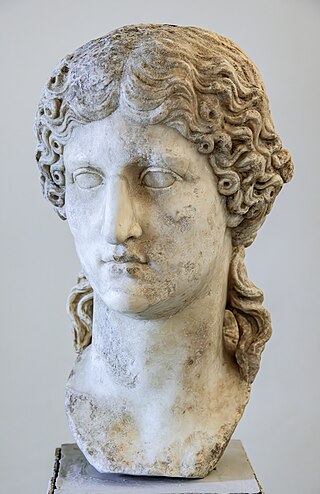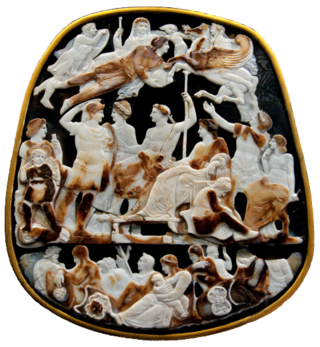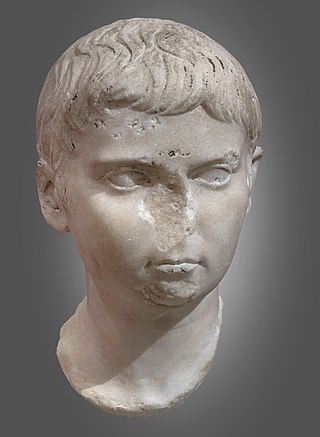Related Research Articles

(Vipsania) Agrippina the Elder was a prominent member of the Julio-Claudian dynasty. She was the daughter of Marcus Vipsanius Agrippa and Augustus' daughter, Julia the Elder. Her brothers Lucius and Gaius Caesar were the adoptive sons of Augustus, and were his heirs until their deaths in AD 2 and 4, respectively. Following their deaths, her second cousin Germanicus was made the adoptive son of Tiberius, Augustus' stepson, as part of the succession scheme in the adoptions of AD 4. As a result of the adoption, Agrippina was wed to Germanicus in order to bring him closer to the Julian family.

The Julio-Claudian dynasty comprised the first five Roman emperors: Augustus, Tiberius, Caligula, Claudius, and Nero.

Tiberius Julius Caesar Augustus was Roman emperor from AD 14 until 37. He succeeded his stepfather Augustus, the first Roman emperor. Tiberius was born in Rome in 42 BC to Roman politician Tiberius Claudius Nero and his wife, Livia Drusilla. In 38 BC, Tiberius's mother divorced his father and married Augustus. Following the untimely deaths of Augustus's two grandsons and adopted heirs, Gaius and Lucius Caesar, Tiberius was designated Augustus's successor. Prior to this, Tiberius had proved himself an able diplomat, and one of the most successful Roman generals: his conquests of Pannonia, Dalmatia, Raetia, and (temporarily) parts of Germania laid the foundations for the empire's northern frontier.

Marcus Agrippa Postumus, later named Agrippa Julius Caesar, was a grandson of Roman Emperor Augustus. He was the youngest child of Marcus Vipsanius Agrippa and Julia the Elder. Augustus initially considered Postumus as a potential successor and formally adopted him as his heir, before banishing Postumus from Rome in AD 6 on account of his ferocia. In effect, though not in law, the action cancelled his adoption and virtually assured Tiberius' emplacement as Augustus' sole heir. Postumus was ultimately executed by his own guards shortly after Augustus' death in AD 14.

The gens Livia was an illustrious plebeian family at ancient Rome. The first of the Livii to obtain the consulship was Marcus Livius Denter in 302 BC, and from his time the Livii supplied the Republic with eight consuls, two censors, a dictator, and a master of the horse. Members of the gens were honoured with three triumphs. In the reign of Augustus, Livia Drusilla was Roman empress, and her son was the emperor Tiberius.

Lucius Aelius Sejanus, commonly known as Sejanus, was a Roman soldier, friend, and confidant of the Roman Emperor Tiberius. Of the Equites class by birth, Sejanus rose to power as prefect of the Praetorian Guard, the imperial bodyguard, of which he was commander from AD 14 until his execution for treason in AD 31.

Drusus Julius Caesar, also called Drusus the Younger, was the son of Emperor Tiberius, and heir to the Roman Empire following the death of his adoptive brother Germanicus in AD 19.

Drusus Caesar was the grandson by adoption and heir of the Roman emperor Tiberius, alongside his brother Nero. Born into the prominent Julio-Claudian dynasty, Drusus was the son of Tiberius' general and heir, Germanicus.
The gens Scribonia was a plebeian family of ancient Rome. Members of this gens first appear in history at the time of the Second Punic War, but the first of the Scribonii to obtain the consulship was Gaius Scribonius Curio in 76 BC.
Several men of plebeian status were named Lucius Scribonius Libo during the Roman Republic and Roman Empire; they were members of the gens Scribonia.
Marcus Livius Drusus Claudianus was a senator and praetor of the Roman Republic. He was born with the name Appius Claudius Pulcher, into the patrician family of the Claudii Pulchri but adopted by a Livii Drusi as a small child. His daughter Livia Drusilla became the wife of the first Roman Emperor Augustus, and he was a direct ancestor of the Julio-Claudian emperors Tiberius, Caligula, Claudius and Nero.

FuriaLivia Medullina Camilla was the second fiancee of the future Emperor Claudius.
Quintus Junius Blaesus was a Roman politician who lived during the reigns of Augustus and Tiberius. He was the maternal uncle of Lucius Aelius Sejanus, the Praetorian Prefect of Emperor Tiberius.
Marcus Aurelius Cotta Maximus Messalinus was a Roman Senator who was a friend of the first two Roman emperors Augustus and Tiberius.
Libo may refer to:
Marcus Livius Drusus Libo was an ancient Roman consul of the early Roman Empire. He was the son of Lucius Scribonius Libo and adopted brother of the empress Livia. His natural paternal aunt was Scribonia, the second wife of Augustus, as a consequence of which he was a maternal first cousin of Julia the Elder.
Lucius Arruntius was a Roman senator praised by the ancient Roman historian Tacitus. He lived throughout most of the reigns of the two first Roman emperors, Augustus and Tiberius. In 6 AD he was appointed consul, and then governor of Hispania Tarraconensis around 25 AD, which he governed in absentia for over 10 years. Throughout the latter part of his life he was plagued by hostility from the Praetorian Guard prefects, Sejanus and Macro, which culminated in his suicide in 37 AD after being arraigned on a trumped-up charge of irreverence to the then-emperor Tiberius.
Gnaeus Cornelius Lentulus "Augur" was a politician and general of the early Roman Empire during the reign of Augustus, who became consul in 14 BC as the colleague of Marcus Licinius Crassus Frugi. Enormously wealthy, he reputedly was forced by emperor Tiberius to commit suicide in 25 AD.
Sulpicia Praetextata was an ancient Roman noblewoman who lived in the Roman Empire in the 1st century.
LuciusFulcinius Trio was a Roman senator who came from a plebeian family. Trio was an active prosecutor (delator) during the reign of Tiberius who developed a reputation for making accusations. He was governor of Lusitania from about 21 to 31, before returning to Rome to hold the office of consul suffect with Publius Memmius Regulus in 31. His friendship with Sejanus would lead to allegations that ended with his suicide in early 35.
References
- ↑ Hallett, Judith P. (2014). Fathers and Daughters in Roman Society: Women and the Elite Family. Princeton Legacy Library. Vol. 682. Princeton University Press. p. 159. ISBN 9781400855322.
- ↑ Pettinger 2012, pp. 222–233.